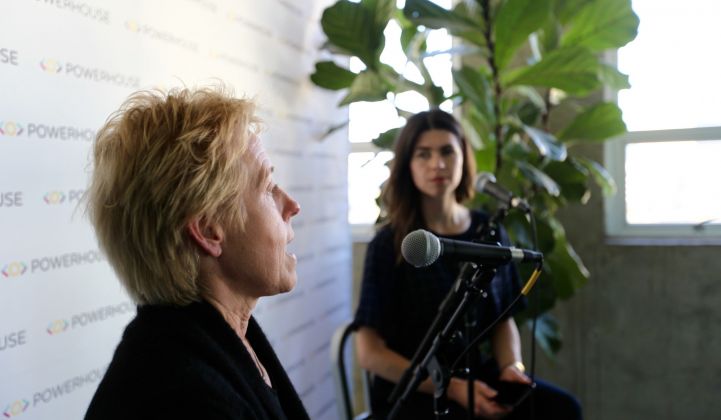AMS, the commercial energy storage pioneer turned software company, has changed its leadership.
Susan Kennedy, the veteran of California politics and energy policy who founded the company in 2014, handed off the CEO role last week after five years at the helm. She will remain involved in company strategy and has taken the title of board chair, with duties including fundraising and evangelizing on behalf of the company.
Seyed Madaeni has stepped into the role of CEO, after having led development of the company's software algorithm for economic dispatch of energy assets in complex market conditions. He brings doctorate-level technical expertise as well as a career in energy markets and algorithmic trading at Pacific Gas & Electric, SolarCity and Tesla before joining AMS.
"We’ve been working toward this day for a long time," Kennedy told Greentech Media. "[Madaeni] is the visionary behind the AI platform. That vision is what is going to guide this company to scale."
The succession caps off a year in which the company turned its strategic pivot toward software into a business reality.
AMS went to market in Australia, providing software to help renewable power plants make more money by anticipating moves in the market. The algorithm, for instance, can predict negative pricing and curtail wind farms to save their owners money, something that human traders would be hard-pressed to achieve.
As of September, AMS had signed five contracts to control 2,000 megawatts in Australia.
"That number has increased significantly both in terms of signed contracts and assets we’re operating," Madaeni said this week. "We're at the tipping point where we really want to accelerate and grow the company."
The software is now ready to deploy in California, and AMS is in talks with large plant operators there, he added.
Lingering development
AMS still has a storage development operation charged with building out the virtual power plant contracted to Southern California Edison, which put AMS on the map back in 2014. Deployments are about two-thirds complete.
Kennedy was among the first entrepreneurs to argue that batteries located on business properties could provide value as a networked grid asset. Having previously served as chief of staff to Gov. Arnold Schwarzenegger and as a grid regulator on the California Public Utilities Commission, Kennedy brought a deep understanding of the needs of the evolving grid and the cast of stakeholders that could benefit from a new approach.
Winning contracts is one thing; developing multiyear grid infrastructure projects as a bootstrapped startup is another matter entirely.
AMS soon ran into difficulty managing the working capital required for that line of work, as Kennedy later recalled. She secured a financial partner in Macquarie, which stepped in to finance the assets that AMS developed and operated. But when AMS went to raise a Series B, it needed a new story to tell.
It landed on software, in particular using artificial intelligence to crunch the myriad variables that influence competitive energy markets, while accounting for physical and regulatory operational constraints. AMS closed a $34 million round in the summer of 2017 and got to work building the platform.
"We started out more as a project company, and now we’re a product company," Kennedy said.
Now that the software has made it to market and attracted paying customers, the leadership has another problem to tackle. The reborn software company still has a development company nestled inside it.
"We can’t continue to operate as if it's one company with these different business models," Kennedy said. "We’ll figure out how we're going to structure the company so both can achieve their goals."
That process could include include selling off that division or keeping it in-house with a different financing and management structure. The company has not made the final call.
The commercial storage industry as a whole has grappled with the slow pace of regulatory change, which needs to happen for distributed storage to monetize all the value it could provide. Peers like Stem and Engie Storage have evolved their business models too, focusing more on software and larger-scale storage projects in New England.
Kennedy hasn't given up on her original vision: the belief that small-scale installations can help businesses while ushering in a cleaner, more efficient grid.
"It’s a really, really slowly evolving regulatory and market rule environment, but it’s moving in one direction," Kennedy said. "You will slowly but surely see those assets be monetized in energy markets around the world."




